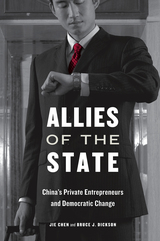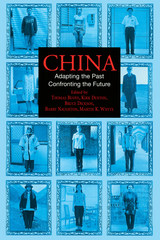2 books by Dickson, Bruce

Allies of the State
China's Private Entrepreneurs and Democratic Change
Jie Chen and Bruce J. Dickson
Harvard University Press, 2010
Jie Chen and Bruce J. Dickson draw on extensive fieldwork as they explore the extent to which China’s private sector supports democracy, surveying more than 2,000 entrepreneurs in five coastal provinces with over 70 percent of China’s private enterprises.The authors examine who the private entrepreneurs are, how the party-state shapes this group, and what their relationship to the state is. China’s entrepreneurs are closely tied to the state through political and financial relationships, and these ties shape their views toward democracy. While most entrepreneurs favor multi-candidate elections under the current one-party system, they do not support a system characterized by multi-party competition and political liberties, including the right to demonstrate. The key to regime support lies in the capitalists’ political beliefs and their assessment of the government’s policy performance. China’s capitalists tend to be conservative and status-quo oriented, not likely to serve as agents of democratization.This is a valuable contribution not only to the debates over the prospects for democracy in China but also to understanding the process of democratization around the globe.
[more]

China
Adapting the Past, Confronting the Future
Thomas Buoye, Kirk Denton, Bruce Dickson, Barry Naughton, and Martin K. Whyte, Editors
University of Michigan Press, 2002
Completely updated, China: Adapting the Past, Confronting the Future is the latest in a series of classroom units on China from the Center of Chinese Studies at The University of Michigan. It is not only ideal for courses on contemporary China but also an excellent supplement for courses in area studies, international affairs and economics, and women's studies.
Each section, in addition to essay and excerpts, also includes a bibliography of additional topical works as well as suggestions for complementary video and internet teaching resources.
Geography and History: Presents a broad sketch of Chinese history from earliest times and a detailed discussion of the forces that have shaped modern Chinese history. Geography sharpens the focus to China’s rich ecological and ethnic diversity.
Politics: Addresses political issues in post-Tiananmen China, including corruption, human rights, US-China relations, democratic reform, and religious and political dissidents.
Society: Examines contemporary social problems that have emerged in the post-Mao era, including divorce, migrant labor, family planning, problems facing Chinese women, and the proliferation of Chinese and Western religions.
Economy: Assesses the post-Mao economy after twenty years of experimentation and reform, including development of private enterprises, income disparities, case studies in rural and urban economic development, and the prospects for future growth.
Culture: Reviews 20th century Chinese literature, the intersection between politics and the arts, the explosion of popular culture, and changing visual culture in modern China.
Future Trends: Explores the prospects for democratization, generational change in leadership, the direction of modernization, and China’s prospects for political liberalization.
[more]
READERS
Browse our collection.
PUBLISHERS
See BiblioVault's publisher services.
STUDENT SERVICES
Files for college accessibility offices.
UChicago Accessibility Resources
home | accessibility | search | about | contact us
BiblioVault ® 2001 - 2024
The University of Chicago Press









